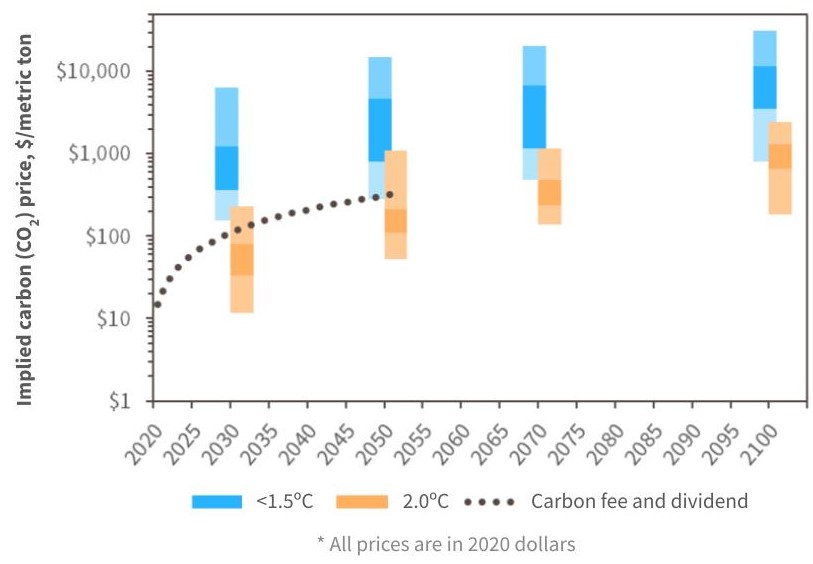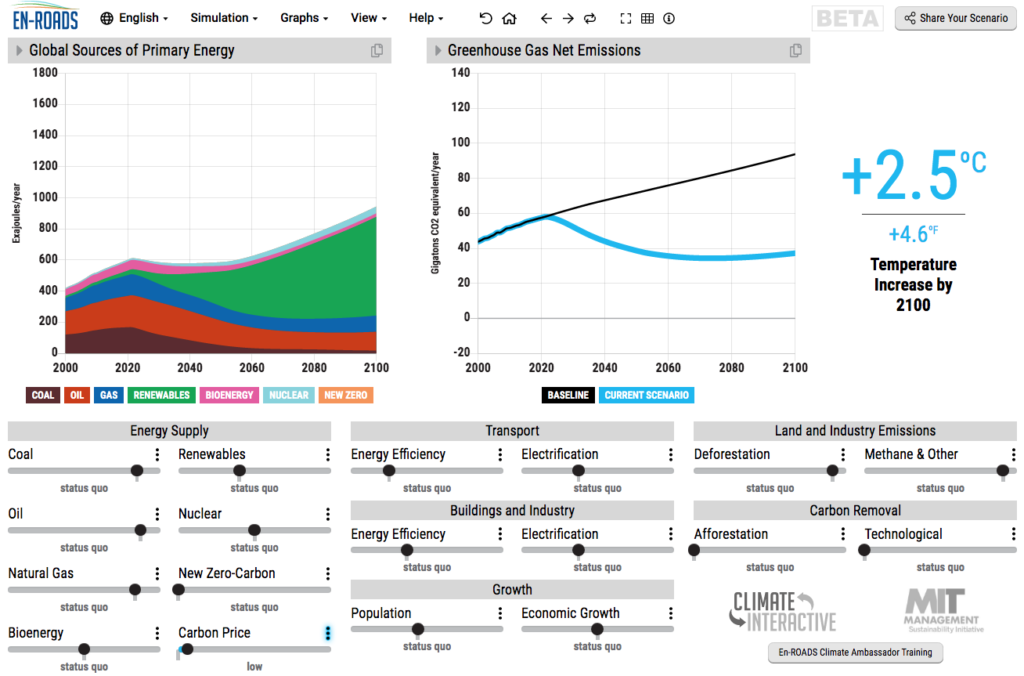For many years, civil society, NGOs, and environmentalists have asked the G7 to end fossil fuel subsidies. Each year, the G7 promised to do so, referencing a date sometime far in the future.
They have made limited, if any, progress towards this goal.
In the preparation for the upcoming G7 Leaders Summit, we believe there’s an alternative to the usual request to end fossil fuel subsidies. A climate solution more impactful and actionable, backed by evidence showing it will end fossil fuel subsidies as a direct result: carbon pricing.
We call on the G7 to cooperate in establishing international agreement on effective carbon pricing and international trade. This is the single most important policy to close the emissions gap and contribute to net-zero before 2050.
To ensure fairness, we also ask for commitment to follow the OECD and World Bank’s “FASTER Principles for Successful Carbon Pricing”. These principles were adopted by the Carbon Pricing Leadership Coalition, which includes six of the G7 countries, along with many other ambitious countries, businesses, international financial institutions, and civil society partners.
Adopting a rising price with border adjustments and rebating the revenue equally to citizens will solve most of the climate crisis, reduce inequality, improve public health, and have a positive impact on gender inequality.
N.B. Carbon pricing measures can be implemented at no direct cost.

Why is it so important for countries to come to an agreement on carbon pricing at the 2021 G7 summit?
Carbon pricing can provide meaningful political and financial momentum for the G7, prior to this November’s UN Climate Change Conference (COP 26) in Glasgow. The evidence indicating it represents the best next step is as follows:
- The IPCC Special Report on Global Warming of 1.5ºC specifically cites carbon pricing as a necessary measure to limit temperature rise to between 1.5ºC and 2.0ºC.
- G7 members have already acknowledged the importance of carbon pricing, especially in aiming for the more ambitious 1.5ºC goal.
- Evidence from international bodies and economists underscores how effective and efficient carbon pricing is, and that it should be our top priority.
- Carbon pricing is 10 times more effective than ending fossil fuel subsidies for reducing emissions, according to the En-Roads policy modelling tool.
- Carbon pricing can effectively bring an end to fossil fuel subsidies.
- Returning carbon pricing revenues to households can increase incomes, incentivize low-carbon consumption, diversify local economies, and be politically popular, thus securing the market signal. It can simultaneously improve progress on issues related to: inequality, food, health and education.
Each of these points is discussed in more detail below.
The link between carbon pricing and science is in the IPCC 1.5ºC Special Report, showing the price range necessary to achieve 1.5 and 2.0ºC.
IPCC Carbon Price Modeling

For the above analysis, the IPCC assessed 21 different models under 67 different scenarios (different technology and economic assumptions, different temperature outcomes).
Darker sections of the blue and orange bars represent the middle half of all results. The dotted line shows $10 /tCO2e increasing by $10 p.a., broadly supporting a price of $100 per metric ton by 2030, $200 by 2040, and $300 by 2050. This trajectory has the potential to keep warming to around 1.8C.
It is worth noting that carbon pricing impacts are very likely to be stronger than models can show, as standard economic models are not able to include innovation led change.
No one is suggesting carbon pricing will fix everything. However, experts agree it can accomplish the majority of the work needed to reduce greenhouse gas emissions and incentivize a transition to renewable energy.
G7 members’ pre-existing understanding of the importance of carbon pricing.
As 196 nations considered the science, and the urgent need to accelerate climate action, during the COP 21 UN Climate Change negotiations in Paris, most of them committed to the need for a more ambitious agreed upper limit for “safe” global warming. The Paris Agreement called on the IPCC to study the science, and we now know that above 1.5ºC of warming, impacts and costs will become prohibitive and destabilizing.
The Carbon Pricing Leadership Coalition formally launched on the first day of the COP 21. The aim is to convene leaders from the public, private, and multilateral sectors, with experts and advocates, to identify pathways to the most economically efficient transition. Every G7 country is a member, with the single exception of the US. The state of California and several other EU national governments have since joined.
Evidence from international bodies and economists insisting carbon pricing should be the number one priority
Significant numbers of international organizations and world-renowned economists have come forward to endorse carbon pricing as one of the most effective climate solutions available. Some of the most notable endorsements include:
- OECD 2013: Countries should make carbon pricing the cornerstone of climate policy
- OECD 2015: The FASTER principles for Successful Carbon Pricing
- IMF 2020: World Economic Outlook, Chapter 3
- The largest ever economists’ statement on carbon dividends
- European Association of Environmental and Resource Economists (EAERE): European economists’ statement
- Canadians For Clean Prosperity: Carbon pricing can close half the gap to the 2050 target. Canada and Switzerland have implemented similar carbon pricing legislation.
Modelling of the difference between ending fossil fuel subsidies and carbon pricing

Using the En-Roads Policy Simulator from Climate Interactive, the following scenarios cover the discussions by the Civic Society working group on Climate and Energy:
- Current projections indicate a baseline warming of 3.6ºC
- Ending fossil fuel subsidies made no material difference, resulting in 3.6ºC
- Only subsidizing renewables results in a warming of 3.5ºC
- Subsidizing renewables and aggressively taxing fossil fuels results in a warming of 3.0ºC
- Leaving fossil fuel subsidies as baseline and pricing carbon as per IPCC graph above results in warming of 2.6ºC
- Leaving fossil fuel subsidies, pricing carbon as per IPCC, and subsidizing renewables can result in a warming of 2.5º C
This demonstrates the importance of implementing legislation like carbon pricing to help the market adjust to green energy. Failing to do so will make it impossible to completely phase out fossil fuels. Focusing on steadily rising carbon pricing instead of only ending fossil fuel subsidies will be considerably more impactful on the projected global temperature rise.
Carbon pricing is essentially kryptonite to fossil fuel subsidies
Effective carbon pricing will directly lead to the end of fossil fuel subsidies.
Powerful industries have lobbied for fossil fuel subsidies for decades. Governments have proven they are unable to end subsidies in the face of further lobbying, consistently promising to phase out in the timescale of a future government (over five years).
Since carbon pricing is a newer policy, it will be met with less resistance when introduced. It is already at work, to varying extents, in all G7 countries.
If the carbon pricing is sufficiently ambitious, it will negate subsidies within a few short years, effectively ending subsidies in the same or less time than currently committed.
As carbon prices rise, it will be necessary to introduce Border Carbon Adjustments (BCA). This policy will make sure industries that either incur carbon costs or invest to go clean don’t face unfair competition from polluters elsewhere. This avoids job losses and related economic and political challenges, and encourages global adoption of carbon pricing (important for the planet). World Trade Organization-compliant BCAs will likely encourage nations with smaller subsidies to challenge and discount higher fossil fuel subsidies from other nations, thus undermining existing subsidies even faster.

Revenue recycling of carbon pricing to citizens can have a positive impact on the other focus areas for Civic Society: inequality, food, health, and education.
There is a great deal of debate about how revenues from carbon pricing should be spent. We at Citizens’ Climate Lobby (CCL) believe 100% of the revenue should be distributed equally amongst citizens in the form of monthly payments, or climate income. This has been demonstrated in Canada and Switzerland to deliver ongoing public and political support ensuring the credibility of the market price signal.
In addition to driving down GHG emissions and helping phase out fossil fuels, this approach addresses key social issues like income inequality, food insecurity, public health, and gender inequality.
Discussions with politicians and governments show that whilst some revenue should be recycled to citizens—especially those that belong to the most vulnerable and marginalized communities—the amounts and methods of redistribution vary.
One of these key discussions surrounds the pros and cons of direct payment to vulnerable and marginalized communities over the funding of government identified priorities related to climate instability. Key evidence demonstrates that when money is returned to households:
- Most poorer families will be better off, as their carbon footprints are lower than average. Up to 70% of the population may be eligible to receive revenue depending on how much the government recycles. Since wealthier families generally consume more, any revenue gains will be negated. As a result, this policy is progressive and directly impacts income inequality. The London School of Economics has demonstrated how climate revenue distribution could work in the United Kingdom. These results are consistent with models of the US and Canadian economies.
- Families prioritize the same areas as they always have: food, health, education, and leisure. In most families, these responsibilities are taken on by the leading woman in the household. As additional income becomes available, these priorities would be addressed according to the decision maker in each household.

International support for carbon pricing and border carbon adjustment policy
In addition to the above arguments, there is a substantial list of organizations and significant individuals who endorse carbon pricing and recycling the revenue to citizens. The list encompasses over 2500 endorsements from academic institutions, faith groups, NGOs, businesses, media, and the public sector for The Energy Innovation and Dividend Act (HR 2307), a carbon pricing bill currently under consideration in the United States House of Representatives. There is also support from 16 European NGOs for the European Citizens’ Initiative for the same policy.
The support has not gone unnoticed. Recently, the G7 released a statement mentioning the importance of carbon pricing:
We recognise the potential of carbon markets and carbon pricing to foster cost efficient reductions in emission levels, drive innovation and boost the breakthrough of technologies that enable a transformation to net zero. We affirm the fundamental importance of environmental integrity and sustainable development in the design of high integrity carbon market mechanisms, including those used for voluntary purposes, which should be based on robust rules and accounting that ensure avoidance of all forms of double counting. They should require the use of conservative emissions and emissions reductions estimations and assumptions, as well as safeguards to mitigate carbon leakage risks, avoid negative social and biodiversity impacts, and to address potential reversals. We further note that such mechanisms can mobilise private finance and help to close the ambition gap for limiting global warming to 1.5°C.
Given the overwhelming amount of supporting data and endorsements, strong national climate policy, science-compliant transition timelines, and improved global cooperation, it is imperative that the G7 countries work together to establish international convergence on effective carbon pricing and international trade at the 2021 summit.
We welcome any constructive criticism, additional data, or even support. Please email your feedback to info@citizensclimateeurope.org, and we will endeavour to update the article if necessary. See our explanation about climate income for more information on our proposed climate policy.
Featured photo by Dominic Spohr on Unsplash
